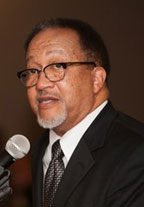 Climate change and Black America
Climate change and Black America
Benjamin F. Chavis, Jr., says that climate change for African Americans is a matter of life and death.
By Benjamin F. Chavis, Jr., NNPA News Wire Columnist
Why are millions of Black American youth and elders suffering disproportionately from asthma and other respiratory illnesses much more than the national norm? Why is the overall public health status of Black Americans at a higher risk than other Americans? What do public environmental and climate change policies at both the state and federal levels have to do with the quality of life for Black America?
The foregoing are urgent and critical questions that require answers. I learned a long time ago that before you can get the right answers to social, economic and political problems, you first have to ask the right questions.
There is also an important current and relevant debate going on in the U.S. Congress and in many state legislatures a-bout the initiatives and executive policies of the Obama Administration on climate change. Just last week, the U.S. Senate voted to oppose President Barack Obama’s flagship climate change policy, the “Clean Power Plan.” Why would the Senate vote to prevent improving public health in America?
The Obama Clean Power Plan will set achievable standards to reduce carbon dioxide emissions by 32 percent from 2005 levels by 2030.
By setting these goals and enabling states to create tailored plans to meet them, the Clean Power Plan will:
- Protect the health of all American families, and in particular Black American families:
- Prevent up to 3,600 premature deaths
- Prevent 1,700 non-fatal heart attacks
- Prevent 90,000 asthma attacks in children
- Prevent 300,000 missed workdays and schooldays
- Increase economic development and lead to 30 percent more renewable energy by 2030
- Create tens of thousands of jobs that are crucially needed by Black Americans
- Continue to lower the costs of renewable energy
A civil rights type of grassroots rally and mass meeting was recently held in Atlanta, Georgia at Morehouse College to support the Clean Power Plan. Morehouse President John S. Wilson, Sr. warned, “Nearly half of the people living near coal-fired power plants are people of color, therefore we must do all we can to reduce this threat to public health in our communities…Morehouse is proud to engage on such an important issue, one that impacts everyone on our campus, in our city, and in the country.”
We, therefore, especially salute the efforts on this issue today by the U.S. Black Chamber, Inc. (USBC) lead by its dynamic president and CEO, Ron Busby Sr. The U.S. Black Chamber, Inc. has launched a national conversation about the economic and public health impacts of climate change in urban America starting in Austin, TX, Baltimore, MD and in St. Louis, Mo., and will highlight that climate change is a real and growing threat to the Black community. This national discussion-tour will also rally support for President Obama’s Clean Power Plan.
In a press statement, the U.S. Black Chamber, Inc. stated, “Nearly 40 percent of the six million Americans living close to coal-fired power plants are people of color, and are disproportionately African American. The toxins from these plants are responsible for thousands of premature deaths, higher risks of asthma attacks and other respiratory diseases, and hundreds of thousands of missed work and school days. African American trades are also being excluded from conversations centered on the green economy boom.”
Ron Busby also serves on the Board of Directors of the National Newspaper Publishers Association Foundation (NNPAF) and we know that the NNPA will also help raise more awareness and involvement of Black America on this issue. The future of our families and communities is at stake.
Climate change for African Americans is a matter of life and death. It is a matter of improving public health verses benign neglect and deliberate environmental racism. We must not be excluded from this national debate. We will not be silent about this airborne and insidious form of deadly racial discrimination.
The Green Movement has to be an inclusive movement reflective of the values, principles and realities of all people who continue to be impacted by bad environmental practices and policies. While the majority of the members of the U.S. Senate and many state governors are in some sought of a backward political denial concerning the impact of climate change, we cannot allow them to cause our communities more environmental harm.
At least the governors of California, Oregon, and Washington have announced their support of the Clean Power Plan. Where does your governor and state stand on this issue? Climate change is real and Black America will have to speak out more effectively on this issue going forward.
